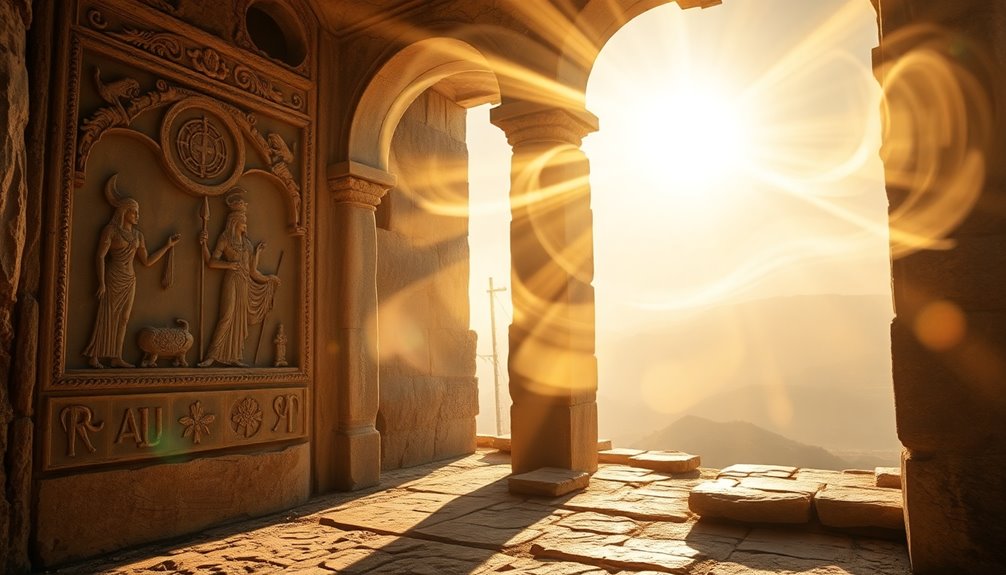Ruach is a Hebrew word meaning "breath," "wind," or "spirit." It's significant in biblical texts, appearing nearly 400 times in the Old Testament. Ruach represents the essence of life, often associated with the Spirit of God, as seen in Genesis 1:2 during creation. It's connected to emotional and spiritual dimensions, affecting one's will and conscience. Ruach also signifies divine empowerment, linking it to the work of the Messiah. Understanding ruach can enrich your perspective on spirituality and community. If you're curious about how ruach influences everyday life and biblical teachings, there's much more to explore.
Key Takeaways
- Ruach means "breath," "wind," or "spirit" in Hebrew and represents the essence of life in living beings.
- It is often associated with the Spirit of God, particularly in creation narratives like Genesis 1:2.
- Ruach signifies both emotional and spiritual dimensions, including will and conscience, as seen in various scriptural references.
- Cultural misunderstandings often reduce ruach to mere emotional experiences, overlooking its role as a personal entity in faith.
- The concept of ruach emphasizes the Holy Spirit's ongoing work in both the Old and New Testaments, empowering individuals and communities.
Introduction

When you explore the term "ruach," you'll discover its profound significance in Hebrew culture and scripture. This Hebrew word, translating to "breath," "wind," or "spirit," embodies the essence of life within all living beings.
Ruach isn't just about the physical act of breathing; it also encompasses emotional and spiritual dimensions, representing human will, reason, and conscience.
In many instances, ruach is identified with the Spirit of God, especially in Genesis 1:2, where it reflects God's creative power during the world's formation. This connection highlights how ruach serves as the source of life, attributed to God's role in animating both humans and animals, as seen in passages like Job 33:4 and Numbers 27:16.
The theological implications of ruach extend beyond mere existence; they include divine guidance, empowerment, and the anticipation of a Messiah, as prophesied in texts like Isaiah 11:2.
Understanding ruach gives you a deeper insight into the relationship between the Spirit of God and the vibrant life force that animates creation, enriching your appreciation of Hebrew scripture and its teachings.
Scriptural References to Ruach

When you explore the scriptural references to ruach, you'll find it woven throughout the Old Testament, highlighting its significance in understanding God's presence.
From its first mention in Genesis to powerful proclamations in prophetic texts, these references reveal the multifaceted nature of ruach as spirit, wind, and breath.
Let's look at both primary and secondary Bible references to see how this term shapes our understanding of the divine.
Primary Bible References
Exploring the term ruach reveals its profound significance throughout the Old Testament, appearing nearly 400 times and often translated as "spirit," "wind," or "breath" based on context.
One of the most striking references is in Genesis 1:2, where ruach is described as the "Spirit of God" hovering over the waters during creation, symbolizing divine presence and activity. This foundational moment underscores the creative power of the Spirit.
In Psalm 51:11, you see ruach referenced as the "holy spirit," emphasizing its essential role in fostering a relationship with God and pursuing spiritual purity.
Meanwhile, Job 33:4 states, "The Spirit of God has made me; the breath of the Almighty gives me life." Here, ruach is highlighted as the source of life and vitality, reinforcing its importance in your existence.
Additionally, Isaiah 61:1 proclaims, "The Spirit of the Sovereign LORD is on me," indicating how the empowerment of the Messiah comes through ruach for ministry and proclamation.
These primary references illustrate how ruach embodies God's spirit, breath, and life throughout the Scriptures.
Secondary Bible References
The term ruach resonates throughout various passages in the Bible, extending its significance beyond the primary references. You'll find that it appears nearly 400 times in the Old Testament, emphasizing its connection to the Spirit of God and the essence of life itself.
For instance, in Genesis 1:2, ruach Elohim (the Spirit of God) hovers over the waters, showcasing its pivotal role in creation.
In Psalm 51:11, the mention of ruach hakodesh (Your holy spirit) highlights how the Holy Spirit is linked to moral integrity, particularly in the context of repentance.
Job 33:4 further illustrates this life-giving aspect by stating, "The Spirit of God has made me, and the breath of the Almighty gives me life." This connection between ruach and the breath of life is profound, revealing how divine presence sustains existence.
Lastly, Isaiah 61:1 mentions ruach Adonai Yahoveh (the Spirit of the Lord God), emphasizing the empowerment of the Messiah and His mission to bring good news to the afflicted.
Each reference deepens your understanding of ruach as a vital force in both creation and moral restoration.
Ancient Near Eastern Beliefs

In Ancient Near Eastern beliefs, the concept of ruach serves as a vital force connecting the divine with the living world. This life force, often linked to breath and spirit, influenced both humans and animals, symbolizing the breath of life bestowed by deities.
The Sumerians and Babylonians viewed winds and storms as manifestations of divine will, believing their gods controlled the atmospheric ruach to enact purposes on Earth.
Similarly, Egyptian mythology emphasized breath and wind, associating the ka (spirit) with ruach to highlight its role in sustaining life and connecting the divine to the earthly realm. In creation myths, the ruach appears as an active force that brings order to chaos. For instance, in the Genesis creation narrative, the Spirit of God moves over the waters, illustrating this idea.
Ancient texts, including the Epic of Gilgamesh, further reflect the belief that divine ruach could inspire and empower individuals, granting them wisdom or prophetic insight.
Thus, the concept of ruach played a crucial role in shaping the worldview of these ancient cultures, intertwining their understanding of life, spirit, and the divine.
Divine Presence in Creation

Ancient beliefs about ruach illuminate its profound connection to divine presence in the act of creation. In Genesis 1:2, the ruach Elohim (Spirit of God) hovers over the waters, revealing God's active involvement in shaping the universe. This image signifies that the ruach isn't just a passive force; it's the very breath of God that brings life into existence.
In Genesis 2:7, you see this vividly when God breathes into man's nostrils, turning him into a living being. The ruach serves as the divine essence that grants all living creatures their nephesh chayah (living soul) as noted in Genesis 1:30. This connection underscores the idea that everything you see around you carries the imprint of divine creativity.
Furthermore, Job 33:4 reminds you that "The Spirit of God has made me," emphasizing God's direct role in the creation of life. In essence, the ruach is the animating force that imparts vitality and consciousness, illustrating the deep relationship between God and the universe.
Through the ruach, you grasp the sustaining power that upholds all creation.
Misunderstandings About the Holy Spirit

Many people mistakenly view the Holy Spirit as just an abstract force, missing out on its true nature as God's personal presence in our lives.
Cultural interpretations can confuse its role and significance, leading to misunderstandings that limit our experience of the Spirit.
Let's clear up these misconceptions and explore what the Holy Spirit really means for us today.
Debunk Common Misconceptions
Throughout history, misconceptions about the Holy Spirit have persisted, clouding understanding and appreciation of this vital aspect of faith. Many people think of the Holy Spirit as just a force or power, but in Hebrew thought, ruach embodies God's personal presence, integral to His relationship with creation.
Some mistakenly believe the Holy Spirit only appears in the New Testament, yet the term ruach is found nearly 400 times in the Old Testament, underscoring its significance in creation and prophecy.
Others assume the Holy Spirit is reserved for a select few, but biblical prophecies, like Joel 2:28-29, reveal that the Spirit will be poured out on everyone, crossing social and gender barriers.
Additionally, there's confusion between ruach and Shekhinah. While Shekhinah refers to God's divine presence, ruach signifies the spirit or breath of life given by God.
Lastly, many think the Holy Spirit's role ended with the Old Testament, but the New Testament highlights the continuation and fulfillment of the Holy Spirit's work, especially in empowering the Messiah and the early Church.
Understanding these truths enriches your appreciation of the Holy Spirit.
Cultural Interpretations of Spirit
Cultural interpretations of the Holy Spirit often miss the mark, reducing it to mere emotional experiences or natural occurrences. This perspective overlooks the profound spiritual significance of the Ruach as the divine presence of God within believers. Many people mistakenly view the Holy Spirit as an impersonal force, failing to recognize it as a personal entity that engages in meaningful ways with individuals and communities.
In various traditions, the Holy Spirit is relegated to the background, perceived as less essential than God the Father and Jesus. However, scripture emphasizes its crucial role in creation, empowerment, and guidance. Some cultural beliefs portray the Holy Spirit as a solely New Testament concept, ignoring its active presence throughout the Hebrew Bible, especially in creation narratives and prophetic literature.
Moreover, the distinction between Ruach (spirit) and Shekhinah (divine presence) can lead to confusion. Some interpretations conflate these two concepts, missing their unique roles and theological implications within Jewish thought.
Spiritual Gifts in Daily Life

You can tap into your spiritual gifts to guide your everyday decisions and enrich your community.
By embracing these gifts, you not only grow personally but also inspire those around you through spirit-filled activities.
Let's explore how these divine abilities can transform both your life and the lives of others. Additionally, utilizing visualization and affirmations can help you align your intentions with your spiritual gifts for greater impact.
Everyday Decision-Making Guidance
Making decisions can often feel overwhelming, but tapping into the concept of ruach offers a powerful way to navigate daily choices with divine guidance. This breath of God instills life and purpose, encouraging you to seek spiritual insight through prayer. By inviting the Spirit of God into your decision-making process, you can access wisdom, understanding, counsel, and knowledge, as highlighted in Isaiah 11:2.
When faced with uncertainty, recognizing the presence of ruach can deepen your connection to God's will. This awareness helps you align your choices with His guidance, fostering emotional and moral integrity.
It's essential to approach decisions with humility and compassion, allowing these qualities to shape your interactions and outcomes.
Incorporating the insights of ruach into your daily life transforms not just how you make decisions, but also how you relate to others. You can empower yourself and those around you by engaging in prayer, whether individually or in community.
This collective approach amplifies the Spirit of God's influence, leading to more thoughtful and compassionate choices. Embrace ruach in your everyday decision-making, and watch how it enriches your life and the lives of those you touch.
Community Spirit-Filled Activities
Embracing the spirit of ruach in everyday decision-making naturally extends into community activities that highlight spiritual gifts. Engaging in teaching, encouragement, and service fosters unity and support among members, reflecting Ephesians 4:11-13.
You can create a vibrant community by organizing prayer groups and intercessory prayer sessions, where individuals experience the transformative presence of the Spirit of God, enhancing your communal bonds and spiritual growth.
Acts of kindness and service, inspired by the gifts of the Spirit, contribute to the overall vitality of your community while demonstrating Christ's love in action, as noted in Galatians 5:13-14.
By organizing worship events that showcase diverse talents, you encourage participation and foster a sense of belonging, allowing the various manifestations of the Holy Spirit to shine through.
Regular fellowship gatherings, focused on sharing testimonies and experiences of the Holy Spirit's work in daily life, can strengthen faith and inspire others to actively engage in their spiritual gifts.
Through these community spirit-filled activities, you can cultivate an atmosphere where the ruach thrives, empowering everyone to contribute and grow together in faith.
Key Insights on Ruach

Delving into the concept of Ruach reveals its profound significance within the Old Testament, where it embodies the essence of wind, breath, and spirit. This Hebrew term appears nearly 400 times, highlighting its vital role in both divine essence and the life force in creation.
You'll find its importance illustrated in Genesis 1:2, where the Spirit of God (Ruach Elohim) hovers over the waters, marking the beginning of creation.
Ruach is also the source of life, as seen in Job 33:4, which states that the breath of God imparts life to all living beings. This connection emphasizes how essential Ruach is for existence itself.
In prophetic contexts, Ruach signifies divine inspiration and empowerment. For instance, Isaiah 11:2 describes the Spirit resting upon the Messiah, showcasing how Ruach facilitates divine guidance and strength.
It's crucial to differentiate Ruach from Shekhinah, which refers to God's tangible presence. This distinction enriches your understanding of divine interaction in Jewish thought, allowing you to appreciate the multifaceted nature of Ruach, the Spirit of God, in both creation and prophecy.
Additional Resources

A variety of resources are available to deepen your understanding of Ruach and its significance in biblical contexts. One impactful book is "The Power of the Holy Spirit's Names" by Tony Evans. It explores the different names and roles of the Holy Spirit in scripture, enriching your grasp of the ruach of God.
For a more interactive approach, consider using Bible study tools like Logos Bible Software. This platform empowers you to delve into biblical texts related to the Spirit of the Lord, offering various study aids and interpretations.
If you're interested in historical context, Levison's "The Spirit in First Century Judaism" provides valuable insights into early Jewish thought regarding the Holy Spirit, illuminating your understanding of ruach. Additionally, the Encyclopedia Judaica's entry on "Ruach ha-Kodesh" offers a comprehensive look at interpretations and developments within Jewish texts.
Finally, engaging with community initiatives, such as grief support groups and communal prayer, can foster a deeper connection to the transformative power of ruach in collective healing and spiritual growth. Understanding the significance of the Holy Spirit in various contexts can enhance your spiritual journey and provide deeper insights into personal experiences.
These resources will surely enhance your journey in exploring the significance of Ruach.
Frequently Asked Questions
What Is the Meaning of Ruach?
When you explore the meaning of a term like ruach, you find it's rich with significance.
It embodies concepts of breath, wind, and spirit, representing both the physical and the divine. You can think of it as the essence that gives life to all beings and reflects emotional and mental states.
This term captures not just a physical phenomenon but also the deeper qualities of one's character and moral integrity.
What Does the Bible Say About Ruach?
The Bible speaks extensively about the concept of spirit, highlighting its role in creation and human life.
It describes the spirit as God's presence, hovering over the waters and bringing order. You'll find that it's linked to both divine empowerment and personal character.
The scriptures emphasize how this spirit inspires, guides, and shapes individuals, influencing their desires and moral choices, making it a vital aspect of both God's relationship with humanity and individual identity.
How Do You Say "Holy Spirit" in Hebrew?
To say "Holy Spirit" in Hebrew, you use the phrase רוּחַ הַקֹּדֶשׁ (Ruach HaKodesh).
Here, "Ruach" means "spirit" or "breath," while "HaKodesh" translates to "the holy."
When you refer to the Holy Spirit in this way, you're acknowledging its sacred and divine nature.
This term is significant in many religious texts and traditions, emphasizing the connection between the spirit and holiness in your spiritual understanding.
What Is the Ruah of God?
The term "Ruah of God" refers to God's divine presence and creative force. It's often seen as the breath that brings life and sustains all creation.
In the Genesis narrative, you'll notice it hovering over the waters, indicating God's active role in creation.
Additionally, the Ruah empowers individuals, guiding and equipping them for specific tasks, and plays a crucial role in spiritual renewal and redemption for communities and individuals alike.









